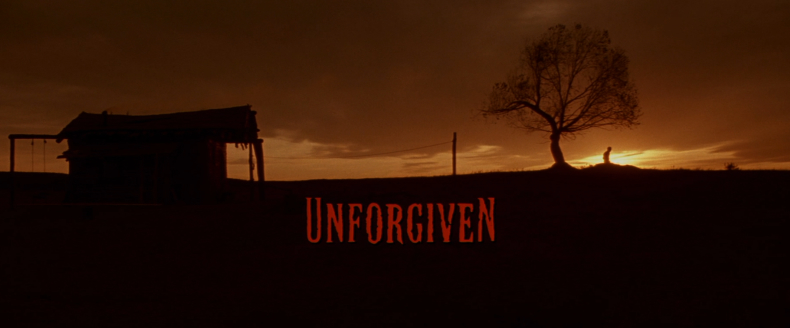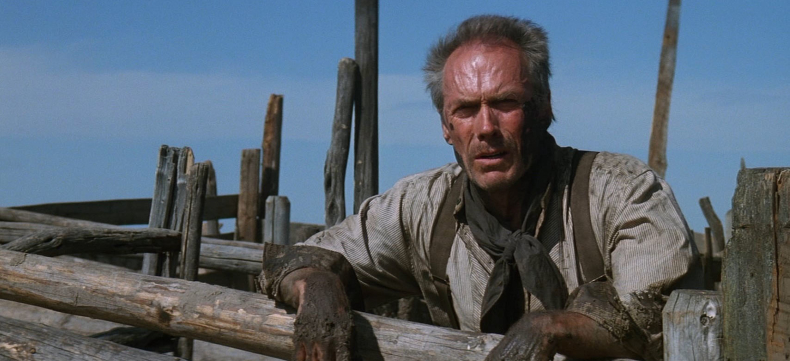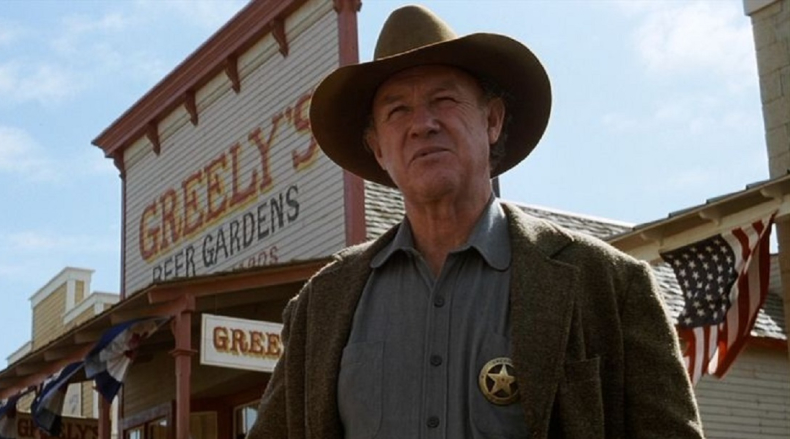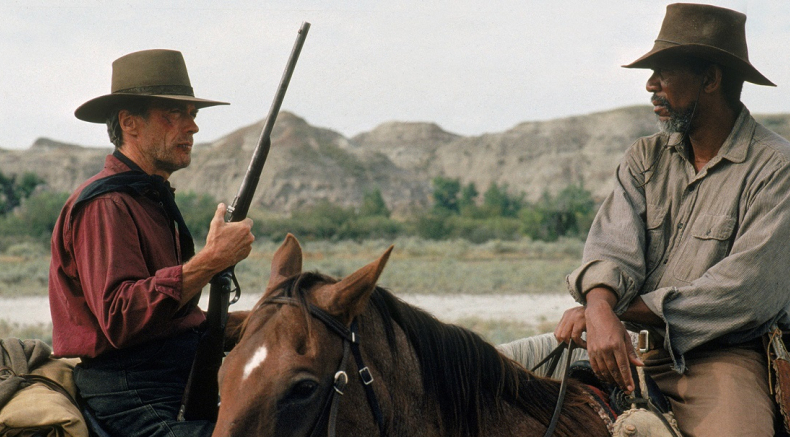Rape, Murder and Redemption | Unforgiven and the Death of the West
“It’s a hell of a thing killing a man. You take away all he’s got and all he’s ever gonna have.” – Unforgiven, 1992
Unforgiven stormed the Oscars in 1992, winning Clint Eastwood his first statuettes for Best Picture and Best Director and became only the third western to win the Best Picture category (the others being Cimarron (1931) and Dances with Wolves (1990)). What made Unforgiven’s success so remarkable was that westerns were practically a dead genre and certainly not the domain of the biggest of screens and awards stages. Kevin Costner’s Dances with Wolves two years earlier had revived an interest in what had once been a staple of American cinema but Unforgiven is as far from Dances with Wolves as you can get.

Unforgiven gave us The Man with No Name as an old man, broken and beaten down by life and the weight of remorse. Clint Eastwood, one of the few iconic western actors still on the scene (at that time and this), portrayed his characters as neither good nor bad, but somewhere in between. He was often the hero, but also the antihero, the man who had done bad things. There is no doubt that he does bad things in Unforgiven, but he does so with a justification that never seemed important to him as a younger man, a justification that he now requires to pick up a gun.
[perfectpullquote align=”right” cite=”” link=”” color=”#F42A2A” class=”” size=”20"]This isn’t a gratuitous western like Tarantino’s Django Unchained or The Hateful Eight.[/[/perfectpullquote]p>
The violence of Unforgiven is one of its standout features, but it is never glorified or random. Used sparingly, the gunplay and the physical violence meted out on the female characters is sparse but intense. Its use demonstrates the futility of violence, that it only begets violence and this is typified by its honest and brutal portrayal of vengeance and vendettas. The final shootout where Little Bill and Will Munny come face to face is devastating for its succinct use of gunplay. This isn’t a gratuitous western like Tarantino’s Django Unchained or The Hateful Eight. Unforgiven doesn’t glorify killing, but instead examines how violence can “corrupt the soul” as Morgan Freeman (Ned Logan) describes it.
Nothing good comes of killing in Unforgiven. The Schofield Kid kills one of the cut whore cowboys, and can’t cope with the aftermath; Little Bill murders Ned in cold blood and meets his end from a vengeful Will Munny; Davey, the innocent one of the two cut whore cowboys dies from a Will Munny bullet and, though that cowboy did nothing wrong, his involvement in the scarring of the whore required an expiation of sorts. Violence will only lead to violence and that is the underlying theme in Unforgiven.

Will Munny, Eastwood’s character, was a man who once killed for fun, who killed out of badness but as the opening titles highlight, the love of a good woman helped him change his ways. We are introduced to Will Munny as an old man. We are not privy to any flashbacks, we don’t see him as the coldblooded killer he was. This is important as we can only engage with Eastwood’s character as he is presented to us. Munny is framed as a hardworking, unfortunate pig farmer struggling to make ends meet; Eastwood’s Munny is an older man looking back on his life with nothing but regrets –
“Ned, you remember that drover I shot through the mouth and his teeth came out the back of his head? I think about him now and again. He didn’t do anything to deserve to get shot, at least nothin’ I could remember when I sobered up.”
Never once does he hide his past but we cannot connect Will Munny, the young man that is almost mythologised by The Schofield Kid, to that of the farmer who hasn’t fired a pistol in 11 years, who can’t hit a tin can from 20 paces with anything other than a shotgun. As strange as it may sound Eastwood builds a sympathy for William Munny, the widowed father of two, and a sense of respect forms. He is presented as a man who, forced by his situation, needs the bounty money on two men who were not unlike him 30 years ago; this last ride is his attempt to atone for his past sins. This is one of the key messages in Unforgiven – there are always consequences. Those two cowboys deserve to die for what they did, just as much as Munny deserves to be haunted by his past. Why should either escape their fate? The fact that Munny is played by Eastwood – The Man with No Name, the High Plains Drifter, the Pale Rider – means that while Will Munny is almost mild mannered in Unforgiven, we have still seen some version of him as this menacing gunslinger that Eastwood played in countless westerns early in his career. Eastwood brought the baggage of his own previous characters with him to enhance Will Munny, probably the best character he has ever played.
[p[perfectpullquote align=”right” cite=”” link=”” color=”#F42A2A” class=”” size=”19"]m>Not too often are two actors presented with the finest roles of their careers in the same film, but that is exactly what happens in Unforgiven.[/pe[/perfectpullquote]
While praising Eastwood as Will Munny, mention must be made of Gene Hackman’s turn as Little Bill Daggett. Not too often are two actors presented with the finest roles of their careers in the same film, but that is exactly what happens in Unforgiven. Hackman’s Little Bill is brilliant because, as we discover as the film moves on, he too has his own chequered past, a man who committed his own fair share of sins, he just did so with a tin star on his chest. But it is very hard to hate Little Bill as while he shows his cold, vindictive side, the viewer understands that Little Bill feels he is on the side of right, that he is doing the right thing.

Take for instance his brutal beating of English Bob, English Bob has done nothing wrong in coming to Big Whiskey but Little Bill uses him as a message to any others coming to claim the bounty on the cut whore cowboys. He beats him to within an inch of his life. What he is doing is wrong, but he’s doing it for the right reasons. While being sadistic, Little Bill is also humourous and likeable and that throws the viewer completely. We need a villain but Hackman navigates that narrow channel between good and bad, dipping into the water of each when he feels like it. For that he is absolutely spellbinding as Little Bill. His building of a house with no plumb angles or his throw away comments – “hell, I even thought I was dead til I found out it was just that I was in Nebraska” – make him human and relatable. He is an appealing character in whom, when regaling Mr. Beauchamp, English Bob’s biographer, we find a playfulness and a humour that inveigles its way into our reading of his character and makes his bursts of vindictive violence even more shocking.
[per[perfectpullquote align=”right” cite=”” link=”” color=”#F42A2A” class=”” size=”21"]The last 20 minutes of Unforgiven is the greatest piece of film making and character building that Clint Eastwood, as either director or actor, has ever achieved.[/perf[/perfectpullquote]p>It should also be noted that our two lead characters, Will Munny and Little Bill – boast character’s names which are a derivative of William, suggesting that both characters are two halves of the one whole. The meanness that Munny is famous for is witnessed in Little Bill’s beating of English Bob and his scourging of Ned and his promise to Ned that he’s going to hurt him bad. This scourging is also a key feature of the film’s final act. The last 20 minutes of Unforgiven is the greatest piece of film making and character building that Clint Eastwood, as either director or actor, has ever achieved. Once Will is told that Ned has been killed by Little Bill he reverts to his cold-blooded killer persona and it is as amazing as it is subtle. One of the Big Whiskey whores tells Munny and The Schofield Kid that Ned is dead but that he, under torture, gave up all the details of Munny and the Kid. As we saw during the scourging, Ned gave Little Bill all the wrong information, he protected Will, but Little Bill knew he was lying and promised Ned unmerciful pain if he didn’t tell him all he knew.
From Ned’s death and Little Bill’s extraction of the truth, we are left in no doubt that Ned died a horrible death. Will, from knowing his friend, also understood that Ned must have been tortured inhumanely to give up his closest ally. This breaks Will and how do we know – he takes the bottle of whiskey, whiskey that he has avoided all through the film, and takes a mouthful. He gave up alcohol when he gave up his killing ways. This man is now the Will Munny of myth and Eastwood does not disappoint, the shootout in Skinny’s whorehouse is one of the best committed to film not for the gunplay or the violence, but for the shear satisfaction of witnessing Will Munny release his version of vengeance on the murderers of his friend:
Little Bill Daggett: “You’d be William Munny out of Missouri. Killer of women and children.”
Will Munny: “That’s right. I’ve killed women and children. I’ve killed just about everything that walks or crawled at one time or another. And I’m here to kill you, Little Bill, for what you did to Ned.”
Until this point Munny had shown the audience nothing in his character that corresponds to the mythology built up around him. Even when he shoots Davey in the guts in the canyon we know that this is not the cold, hard killer of yesteryear. Munny, Ned and The Schofield Kid listen to the wounded man crying out for water but none of his friends are willing to run out into the line of fire to try help him. Munny orders the other cowboys to bring the wounded man some water, honestly promising that they won’t shoot. The tone in his voice and the look on his face lets the viewer know all they need to about what Munny has just done. He picks at the rock and grimaces, Munny didn’t want to kill the cowboy and has taken no pleasure in fatally wounding the man. Match this against the Munny who shot the drover through the mouth for the hell of it and you have a serious disconnect.
He is a tortured man, trying to live with his past and with the fact that every person he meets in Unforgiven knows him as a cold-blooded killer and not the pacifist husband, father and farmer that he became. This shame is evident in everything he does until he discovers Ned’s murder, he then embraces who he was. The fever that Munny catches along the way works as a form of rebirth in this sense, he makes his way back through his own personal hell as he moves through the fever and comes out the other side a different man, in much the same way at the end of the film as Munny rides out of Big Whiskey, the torrential rain washes him clean. He has killed for a valid reason, possibly the only time in his life, to avenge the death of an innocent man.
Innocence is one key element here, no one is entirely innocent in Unforgiven but there are two characters who do not deserve to die – Ned Logan and Davey, one of the cut whore cowboys. Both characters harmed no one, but they are both guilty by way of association, of getting caught up in something they shouldn’t have.

The message of Unforgiven is very clearly told across the arc of the film – you can’t escape your past and you also can’t deny who you are. Munny is a killer and he reverts to killing to settle what has now become a personal vendetta against Little Bill. Ned Logan ran with Munny and got out decades ago, but his fortune was always, inevitably, hitched to his friend so when Munny came calling he couldn’t say no. The Schofield Kid is no more a killer than one of Munny’s young children, as soon as he kills the man who cut the whore in Big Whiskey he repents, he drinks to numb the pain and the shock, he gives away his Schofield pistol to Munny when Will goes to take revenge on Little Bill, telling Munny that he’s never going to use it again. You can’t be a killer if you’re not one, just as much as you can’t shy away from it if it’s one of the only things you are good at. As Will Munny says himself;
“I’ve always been lucky when it comes to killin’ folks.”
Unforgiven is my favourite western, one of my favourite films full stop. In my life time some of the greatest westerns ever made have graced the silver screen – Heaven’s Gate, The Long Riders, Pale Rider, Dance With Wolves, Open Range, Slow West, Salvation – but I feel confident enough in saying that Unforgiven is probably the best western made in the last 40 years, and I’m also happy enough to say that it will stand as being one of the finest westerns ever made. Though Eastwood owns the characters of The Man with No Name, Josey Wales or the Pale Rider, when it comes to drawing a line under his creations, Will Munny will no doubt prove to be the finest of his roles and Unforgiven to be the most important film in his illustrious career.
Unforgiven is probably the film that Eastwood as a western actor deserved, but, as Munny says as he takes a bead on Little Bill in the final shootout, “deserve’s got nothing to do with it.” He earned Will Munny.

